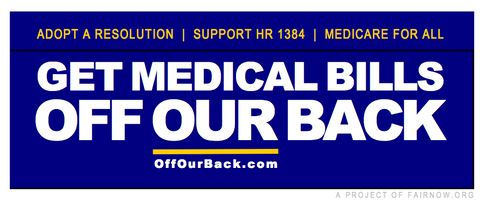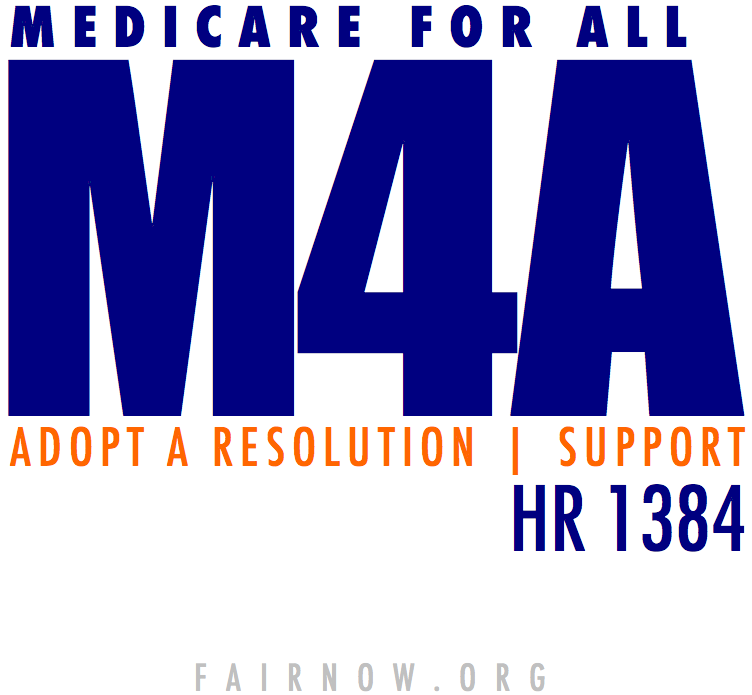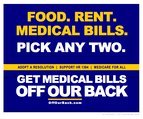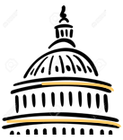Tell your group:
|
|
NOTE: This is a suggested draft. You can adopt it as-is, pick sections or change wording as you please.
All facts stated herein have been researched and verified. If you adopt this resolution or some version of it, please notify us so we can tally and publicize your demand for universal healthcare: everyone in, no one left out. Let's get medical bills off our back once and for all. Thank you! —————————————————————-- Resolution in Support of the "Medicare for All Act of 2019" WHEREAS, 30 million people in the United States completely lack healthcare insurance even under the Affordable Care Act (ACA) and another 40 million are underinsured; and WHEREAS, this 70 million total includes people who live and work in every community across America, with resulting healthcare deficits causing family disruption, financial disruption, community disruption, and employment disruption including unnecessary absenteeism and lost productivity; and WHEREAS, multiple studies have found that lack of healthcare coverage further results in more than 36,000 preventable, unnecessary deaths every year — a shocking death toll; and WHEREAS, Americans annually pay over $10,000 per capita for healthcare, nearly double the average paid by people in other wealthy OECD countries and totaling $3.5 trillion a year, and for this exorbitant sum the US performs at the bottom of key measures such as life expectancy and infant mortality; and WHEREAS, unlike the US, a large majority of OECD countries have chosen to publicly fund universal healthcare; and WHEREAS, US healthcare — based largely on private insurance — is grossly inefficient with 31% of every healthcare dollar being spent on administration, compared with public Medicare spending of less than 2% on administration; and WHEREAS, severe healthcare rationing has become a fact of life for all but the wealthiest US families, with 42% of 30- to 44-year-olds saying within the past year they skipped taking a prescribed medication, 47% skipped preventive care, 49% skipped a medical test or treatment, and 52% avoided a doctor visit when sick or injured — all because they could not afford out-of-pocket costs, even with insurance; and WHEREAS, from 2008 to 2016 pharmaceutical manufacturers jacked up brand-name oral prescription drug prices in the US by more than 9% each year, and inflated prices of injectable drugs by over 15% a year, driving many Americans to purchase the same drugs from Canada and other places at a fraction of the cost; and WHEREAS, 500,000 US personal bankruptcy filings in 2018 were driven wholly or partly by medical bills and some 400,000 of these were filed by people who did have healthcare coverage, further revealing deep inadequacies in the private insurance system; and WHEREAS, 750,000 Americans have become "medical refugees," seeking major surgery or other treatment outside the US because even with their existing healthcare insurance, treatment closer to home was unaffordable; and WHEREAS, due to "out-of-network" and other complex and arbitrary rules imposed by private insurers for their own profit, patients’ choice of healthcare providers is severely curtailed — the exact opposite of a "free market;" and WHEREAS, while local governments and business owners struggle to reduce their employee healthcare cost burden, these costs are rising at triple the inflation rate, burdening cash-strapped budgets while diminishing Main Street businesses' ability to flourish and provide employment while driving up local taxes; and WHEREAS, more than two dozen cost analyses performed by major organizations across the political spectrum have found single-payer universal healthcare to be less costly and more cost-effective than the current patchwork system, including a Koch-funded 2018 study that discovered potential net cost savings averaging $200 billion a year under the single-payer Medicare for All Act; and WHEREAS, in 2017 the New England Journal of Medicine found half of doctors now favor single-payer universal healthcare with an "overwhelming majority" of doctors' verbal comments preferring single-payer; and today, in 2019, multiple large physician and nurse organizations are demanding single-payer Medicare for All; and WHEREAS, when enacted, the federal "Medicare for All Act of 2019" will provide every person in the US with all necessary medical care including prescription drugs; hospital, surgical and outpatient services; primary and preventive care; emergency services, women’s reproductive care, dental and vision care; and long-term care; and WHEREAS, said Act will provide such coverage without copays, deductibles or other out-of-pocket costs, and will slash bureaucracy, protect doctor-patient relationships and (unlike the private insurance system) will assure patients a free choice of doctors; and WHEREAS, Medicare — the greatest healthcare revolution in American history — enrolled all 19 million Americans age 65 or older in a single year (1966) without benefit of computers; and WHEREAS, a 2018 Gallup poll found Medicare and Medicaid recipients more satisfied with their healthcare than other Americans, with 7 out of 8 rating it “excellent” or “good;” and WHEREAS, recent nationwide polls show that more than 60% of voters — including half of Republicans and over three quarters of Democrats — support universal healthcare as a right; and WHEREAS, more than 200 US economists have jointly called on Congress to enact single-payer Medicare for All. NOW, THEREFORE BE IT RESOLVED, that ___________________________________________ supports the Medicare for All Act of 2019 (H.R. 1384 and S. 1129) and calls on Congress to work toward immediate enactment, to ensure appropriate and efficient healthcare for all residents of the United States at a lower net cost and with higher quality outcomes than is possible under the current system. ————————-- |
.
|
.
|
|
.
.
...
|
.
.
...
|
Any pragmatic healthcare plan is inherently an economic plan." —FairNow.org
.
|
...
|
...
|

















